The Blood-Soaked Manic Appeal of Chainsaw Man
by Nicholas Dupree,If you frequent anime and manga circles on social media, there's a high chance you've heard the name Chainsaw Man sometime in the last two years. The series, which launched in late 2018 in Shonen Jump, has been gradually (and then not-so-gradually) building a reputation for itself ever since its chopped, hacked, and sawed its way onto the magazine's pages, to the point where I can tell when new chapters drop by the sound of my Twitter timeline's sobbing. Even without the boost of an anime adaptation, Tatsuki Fujimoto's crass gorefest has managed to grip its audience with wild plot twists, incomparable violence, and a level of artistry only slightly obfuscated by its penchant for absolutely filthy gross-out humor. If you haven't yet made room in your heart for a chainsaw, here's why you may want to fix that.
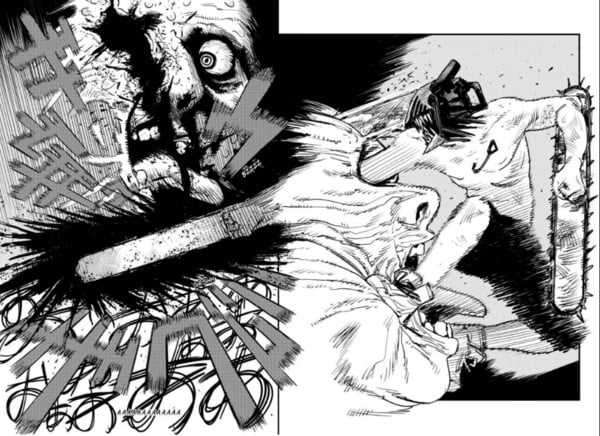
That's the elevator pitch, anyway. While Chainsaw Man's early chapters aren't bad from a narrative perspective, the elements that make it really stand out from the get-go are its drastically irreverent tone and deliciously gory violence. The climactic battle of chapter 1 is a loving and enthusiastic ode to grindhouse horror films as our hero mows down a warehouse of zombies and devils, screeching laughter mixing with the whir and hum of his chainsaws, and it's all brought to life by Fujimoto's rough and exuberant art style. While there is no shortage of hyperviolent manga and anime out there, few series can boast the kind of creative, eye-catching energy Chainsaw Man exhibits on a near-constant basis.
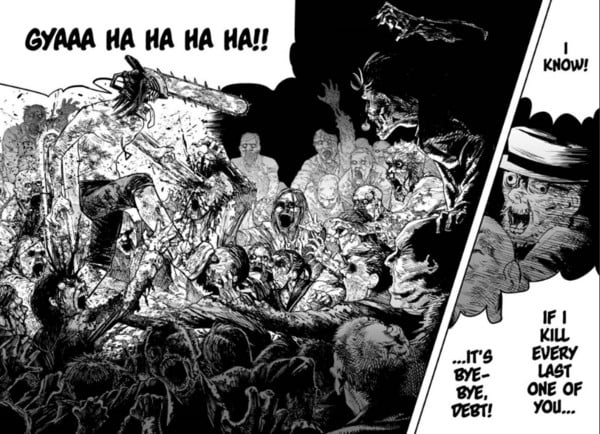
The other defining characteristic is just how crass, crude, and purposefully lowbrow the series' humor is. Plenty of Shonen Jump manga sport a juvenile sense of humor, but only Chainsaw Man has an entire chapter built around two characters kicking each other in the balls during their first work shift together (“A testicle devil attacked his balls,” Denji says). The series also seems aware of that juxtaposition too – throughout its early volumes are multiple jokes where it feels like half the punchline is that Chainsaw Man, in all its gleefully nihilistic indulgence, is sitting in the same magazine as bleedingly sincere and family-friendly series like One Piece or My Hero Academia. It's hard not to read something like Denji challenging an enemy to a “Dream Battle” where if he wins it'll prove the Devil's dream was worth less than his desire to touch boobs, and not picture Fujimoto doodling dicks in the margins of his WSJ issues. That particular blend can make for an acquired taste – I certainly bounced off the early issues and didn't return until the series was over 50 chapters deep – but if nothing else it stands out among its peers.
But even the most attention-grabbing shock-jock horror eventually loses its edge, if only because your audience will get used to a certain baseline of insanity. Chainsaw Man might have survived a while on sheer momentum and novelty, but it wouldn't be sticking around or selling as well as it is if there wasn't more to it – and it turns out beneath all the blood and viscera is a proudly beating heart. Perhaps a cynical heart, but one that nonetheless sympathizes with the struggle to find meaning or solace in a cruel and unpredictable world. That aspect mostly comes through aki, a Devil Hunter who winds up partnered with Denji as his de facto baby sitter. At first the stiff straightman to Denji's feral teen attitude, aki gradually becomes one of the most complex characters in the series, a person paradoxically defined by his desire to save others from the tragedies he's witnessed, while being driven by that desire into a life of constant danger and death. The more we get to know him as he bonds with Denji and the other recurring cast, the sadder and more tragic his every action becomes to us, and as each new story arc piles up bodies you find yourself wanting something, anything to go his way, even if you know it never will.
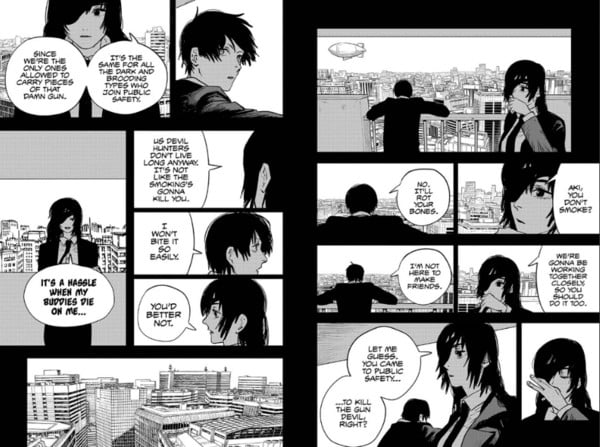
That sentiment is in many ways the key that unlocks Chainsaw Man's true nature for readers: it's still a bombastic, borderline nihilistic maelstrom of gore and dick jokes, but with the larger context it becomes clear that's in part a reaction to the absurd and illogical world it takes place in. When the universe seems to constantly find new ways to get worse, to get more miserable and meaningless, sometimes the only way to relieve tension is to embrace that meaninglessness as freedom. Yes, everything's on fire and likely going to get worse tomorrow, but if you piss on the flames you might at least get a chuckle out of it with your friends. So avenge your dead friend by kicking their killer in the nuts real hard, because god we all need something to laugh about before tomorrow's nightmare rears its head.
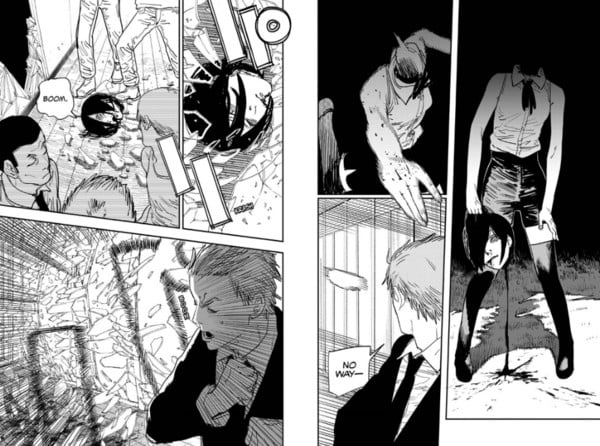
Now even that wouldn't entirely ingratiate me to Chainsaw Man on its own. Much like its shock horror there's only so far that kind of reckless disdain for meaning can last, but Fujimoto delivers it all with some absolutely stunning artistic ambition. The blood-soaked violence is the most attention-grabbing, but as the Devil enemies of the story grow more powerful, his imagination for bizarre, abstract, and genuinely unsettling visual storytelling reaches heights I've never seen in a Jump series before. There are multiple chapters where I came away with no idea what had happened in the story, but still feeling the events crawl under my skin. Devils are meant to be the embodiment of fear, and the absolutely chilling introductions given to their most powerful names make sure you never forget that. These moments are worth seeing for yourself so I won't spoil anything, but just the reveal of the concept of the Gun Devil has stuck with me since the moment I read it.
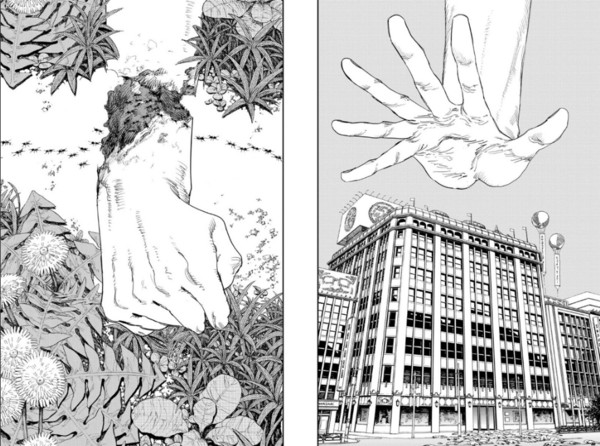
For my money that's the glue holding all of Chainsaw Man's elements together. Through sheer artistic alchemy and a whole lot of chutzpah, a work that should be a shambling, edgelord mess of aimless rebellion that peters out after a dozen chapters has managed to stay fresh and engaging for nearly two years. More practically, in that time it's managed to take much of the online manga community by storm in ways you rarely ever see for a manga with no anime adaptation. It's a bizarre, unpredictable, and undeniably unique thrill ride, and love it or hate it, there's nothing else quite like it.
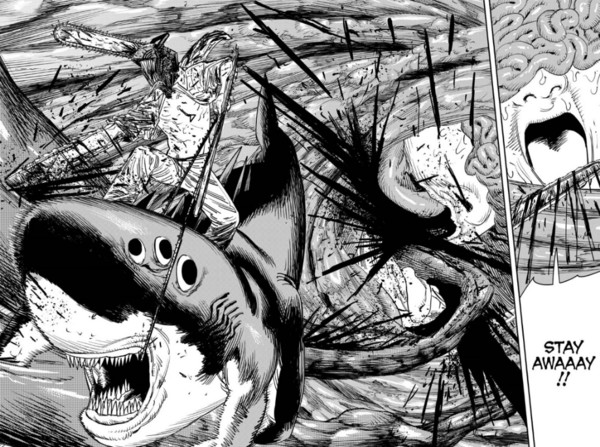
discuss this in the forum (2 posts) |